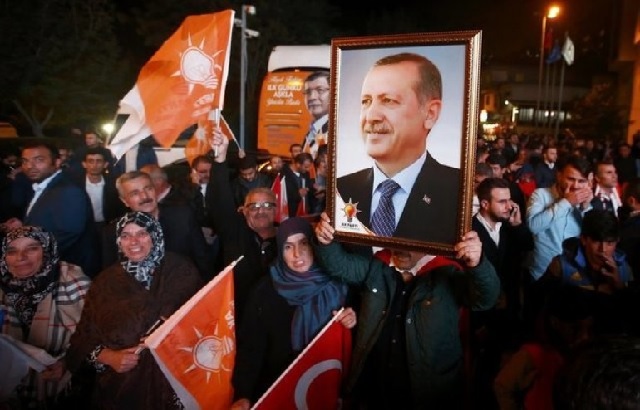By David Gardner
President Recep Tayyip Erdogan of Turkey, a titan to his adoring admirers and a tyrant to his despairing critics, has got his way again. Against all forecasts, including those of the ruling party, he has secured a thumping victory for his neo-Islamist Justice and Development party in Sunday’s re-run of June’s general election, which had left the AKP without a majority for the first time since 2002 and the country with a hung parliament. He gambled on confrontation and he won.
This result ranks among Mr. Erdogan’s most stunning wins in a long string of election triumphs. Yet whereas in the past he could put together his victories by adding, now he wins by dividing and the cost to Turkey could be high.
It is hard to overstate the extent to which Mr. Erdogan although constitutionally obliged to be a non-partisan president of all citizens has sharpened the Sunni, Islamist, and ethnic Turkish identity of the AKP and its constituency, systematically “othering” large minorities of ethnic Kurds and quasi-Shia Alevi, grouped in separate opposition parties, as well as secularists spread between them.
He has used and abused state power, and control of public contracts and punitive tax audits, to dominate the media, purge dissident voices and clamp down on social media. Pro-AKP media routinely smear opponents, real and imagined, mimicking the pugnacious and paranoid style of their leader.
Business leaders who cross the government describe how it paints them as “native agents” of foreign powers, while Mr. Erdogan rails constantly against what he calls ust akil or “superior intelligence” a tentacular international conspiracy to bring him down.
This coarse political coin has delivered for him. But how governable is a Turkey riven by division, with the ethno-sectarian strife of Syria and Iraq spilling over its borders? In the five months after June’s general election, war has resumed between the Turkish state and insurgents of the Kurdistan Workers party (PKK) after a long lull, and Isis bombers have struck inside Turkey, including last month’s attack on a Kurdish peace rally in Ankara, which killed 102.
One of the many paradoxes about Mr. Erdogan is that he is the Turkish leader who brought the country closest to resolving its Kurdish question. Four years ago he opened talks with the PKK, which had waged a 30-year insurgency against the Turkish state.
Whether he was just seeking Kurdish votes for the “super-presidency” he wants, untrammelled by checks and balances, is disputed. But he pulled back once he judged the electoral arithmetic was working against him. This trend accelerated after the June election, when the breakthrough of the Peoples’ Democratic party (HDP), a pro-Kurdish coalition, temporarily thwarted Mr. Erdogan’s plans for one-man rule.
A resumption of attacks by the PKK, which the insurgents claimed were in reprisal for government complicity in Isis bombings of Kurdish targets, enabled the president to launch a military offensive targeting the PKK and Kurdish activists more than Isis. Mr. Erdogan’s target, to win over Turkish nationalist votes and push down Kurdish nationalist votes, was fulfilled. But how, after such bitterness, can the strengthened AKP government get Turkey’s estranged Kurdish citizens back into a civil and negotiating polity?
This is doubly hard given the extent to which Mr. Erdogan has already trampled over the rule of law and hollowed out Turkey’s institutions. But he is not solely to blame.
The PKK leadership, banking the electoral legitimacy won by the HDP in Turkey, and basking in the international legitimacy won by its Syrian Kurd militia allies backed by the US air force as the most effective fighters against Isis in northern Syria has dangerously overplayed its hand. The PKK was overconfident that the de facto Kurdish autonomy spreading across north-east Syria would seep into south-east Turkey and that set off loud alarm bells in Ankara. Emboldened by his election triumph, Mr. Erdogan may carry out his threat to extend the fight against the PKK to its Syrian Kurdish allies, if they take any more territory along Turkey’s southern border. That would complicate the campaign against Isis.
Yet it would make the breach with Turkey’s Kurds irreparable. But the president still has 60 elected HDP MPs in Ankara with whom he can discuss the Kurdish minority’s legitimate demands for more political and cultural space. Vindicated by his own voters, he could choose to be a statesman and talk to them.
‘Courtesy The Financial Times’.


